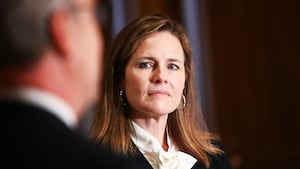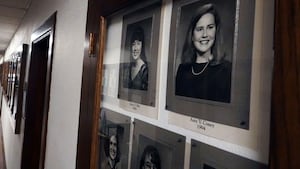The last few months of reproductive rights in America have looked like a cheap Handmaid’s Tale rip-off: a rushed nomination of a conservative judge to the Supreme Court; the president spreading lies about “late-term” abortions; and, in a cinematic flourish, the spread of a deadly pandemic that shuttered abortion clinics in multiple states.
But amid this reproductive dystopia, abortion-access organizations have quietly introduced modern solutions to an increasingly regressive present. Abortion funds—dozens of groups around the country that help people fund and access abortions—are rolling out programs and applications to make their work easier, even as politicians to try to make it harder.
From an Uber-style service to drive patients to their abortions to password-protected lockboxes of cash to help them pay for it, abortion rights advocates are paving the way for a high-tech abortion revolution.
Katie Sullivan, a former board member of the Houston-based Clinic Access Support Network and the organization’s “resident gear head,” spent the last year developing an app that connects volunteer drivers with people who need a ride to clinics. CASN has more than 75 volunteers who have provided more than 1,000 rides a year since 2017—a service that is desperately needed in Texas, where more than a million people live 250 miles from their nearest clinic.

Until recently, CASN volunteers were using a combination of text messages and a restaurant scheduling platform called “Sling” to assign and schedule drives. The system was not secure and not particularly enjoyable—being a ride dispatcher was like “like being a 911 dispatcher for abortion, for free,” Sullivan said—so she and a few other volunteers set out to create their own.
“Most people come to this cause not as experts, just as varying people trying to get something done,” Sullivan said. “And I saw a lot of potential [for technology] to better help these folks, to better work with other organizations.”
Groups like Sullivan’s have multiplied in recent years, due to an increase in restrictive laws laws that make it harder for people to get an abortion when they want to, where they want to. The National Network of Abortion Funds currently lists at least 80 such groups across the country. They offer different services—rides, funding, childcare, plane tickets—but all have the same goal: bridging the widening gap between needing an abortion and getting one.
Even as abortion funds have become more popular, however, most remain small, slightly disorganized, and distinctly grassroots. (CASN, for example, raised approximately $68,000 in 2018, according to tax records. The local Planned Parenthood raised $5 million.) Many are, as Sullivan put it, “run on a spreadsheet and a prayer.” Because of this, their systems are primed for what venture capital vultures would call “disruption” and what most volunteers would call using technology to make their lives easier.
Perhaps the expert on this is Colin Fleming, a software engineer and former DC Abortion Fund board member who in 2015 helped create what has become a blueprint for abortion access technology. Back then, DCAF was growing faster than it knew how to keep up with. Volunteers were taking more than 3,500 calls a year, but still logging the details in Excel spreadsheets. Fleming, along with a few case managers, decided to attend a local Code for America Brigade meeting to see if they could get some help. Someone there connected them to a designer, who connected them to a project manager, who worked with them for a year to develop the perfect product for their needs.
The result is what is now affectionately known as DARIA—a seamless system for logging what every caller needs and what support they’ve already gotten. The idea, Fleming explained, was to enable volunteers to act more like an account manager who knows their client’s needs front to back, rather than a medical receptionist who makes them go through their entire health history at every visit. With DARIA, volunteers spend more time making connections with callers and less time digging through spreadsheets, and feel significantly less burned out.
So far, DCAF has introduced DARIA to six other funds and several more are waiting in the wings. The project, Fleming said, has been “a huge success story for DCAF”—as well as a rewarding way to pay it forward to other funds.“It was a real sea change for the organization,” he said.
Not everyone’s high-tech transition has been as easy. CASN rolled out its new driver app on Feb. 23—three weeks before Texas Gov. Greg Abbott issued a statewide lockdown order. The governor’s order also temporarily shuttered all abortion clinics in the state, making CASN’s services even more necessary at a time when it couldn’t provide them. The group wound up partnering with similar organizations in surrounding states to get abortion-seekers to the nearest functioning clinic.
To this day, CASN hasn’t felt comfortable providing rides in Texas. Sullivan is working on adapting the technology to track rides they fund through third-party apps like Uber and Lyft, and to anonymously record data on the most common requests they receive. But the most important lesson the pandemic taught her, she said, was that abortion access groups need to adapt their technology to work together—and fast.
"If Roe falls, [this is] what the landscape is going to be like, and so we had an interesting test run of what that’s going to necessitate,” she said. “That means we’re going to have to build systems that let us all work well together, even many states away.”
To that end, Sullivan is working on sharing the driver app with the Chicago-based Midwest Access Coalition, which helped CASN when Texas clinics were shut down. And MAC is thinking of sharing its own app, which allows abortion-seekers to pick up cash at lockboxes around the area in order to pay for their procedures. The shutdown, Sullivan said, “made us think we need to find better ways that we can coordinate and do our work together. And I see a lot of room for growth and potential there.”

Pretty much everyone working for an abortion fund knows that that if the Supreme Court overturns Roe v. Wade, the decision making abortion legal nationwide, their work will become a lot more important. (As Robin Marty, a longtime movement journalist, recently told The Cut: “We’re getting to a point where we are literally talking about a region [in the South and Midwest] in which every person who needs an abortion will have to fly somewhere.”) But they also know it could get a lot more dangerous. If states pass laws criminalizing abortion providers—as several have already tried—what’s to stop them from criminalizing volunteers who get patients to a state where the procedure is legal, or even criminalizing the patients themselves?
That's a reality that the Mountain Access Brigade already faces on a daily basis. The Tennessee-based abortion access group provides what its founders like to call “wraparound care”—abortion doula services, education, and financial assistance, all with a welcoming and gender-inclusive lens. Often, this means advising people on how to access an abortion in Appalachia. Occasionally, it means telling them how to get abortion pills at home.
Providing information on at-home abortion isn’t necessarily illegal in Tennessee, but performing one is. (Despite the fact that medication abortion is safer than common drugs like Viagra and penicillin, 18 states still require it to be administered in a doctor’s office.) Because of this, MAB volunteers follow stringent security practices, using pseudonyms and communicating via encrypted apps like Signal. Asked how the overturn of Roe would change their work, the organization's outreach director said: “We already operate under the assumption that what we do could become illegal at any moment.”
That’s one of the reasons MAB launched “Katie,” an encrypted messaging platform named after the pseudonym used by all of its volunteers. The platform functions much like DARIA, allowing case managers to track their clients’ needs and progress, but it also allows users to securely send and receive texts and voice messages. The service operates as a “warm line:” callers leave a voicemail and the system automatically assigns a volunteer to call back and assist them. Callers are not required to leave any identifying information, and the whole process is end-to-end encrypted.

The point of all the secrecy is to protect the volunteers, as well as the callers. Multiple women have been accused of performing their own abortions after suffering miscarriages in recent years, and several have gone to trial. MAB seeks to be a resource where abortion-seekers can find accurate, unbiased information—without leaving an incriminating search history behind for abusive partners, judgmental parents, or aggressive prosecutors to find.
“The last thing we want is [for] someone to contact us about their abortion and then miscarry and be taken to court and go to prison for supposedly inducing their miscarriage,” the outreach director said.
“They have found ways to criminalize reproduction, and so when communicating about it, you just have to be careful,” they added. “It pays to be very safe.”
This level of vigilance isn’t unique to MAB. Advocates are keenly aware that the other side—the “antis,” as they call them—are also upping their tech game. In 2016, hackers breached the website of the National Network of Abortion Funds and sent hundreds of emails bearing anti-abortion messages. The year before, hackers tried and failed to shut down the national Planned Parenthood website.

Because of this, programmers talked about instilling a “culture of security” at their organizations, from teaching volunteers to use password managers to baking safety features into their apps. (The CASN driver app, for instance, automatically deletes identifying information every month.) Sullivan compared the security practices to hand-washing—a simple habit to shield organizations from attacks to their systems. She said she tells new volunteers: “Part of caring about these vulnerable [callers] is making sure they’re secure.”
But there are limits to what technology alone can do. And part of the irony of talking about all this technology, Fleming admitted, is that despite all of his organization’s advancements, getting an abortion in most states is harder now than it was four years ago, when the project began.
“There’s a theory of abortion funds that [they] plug holes, and we’re kind of plugging holes,” he said.
“DARIA doesn’t get anyone an abortion on their own. DARIA is one negotiable step in a big-ass supply chain,” he added later. “We’re helpful, but programming isn’t going to fix the world."








